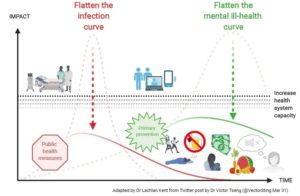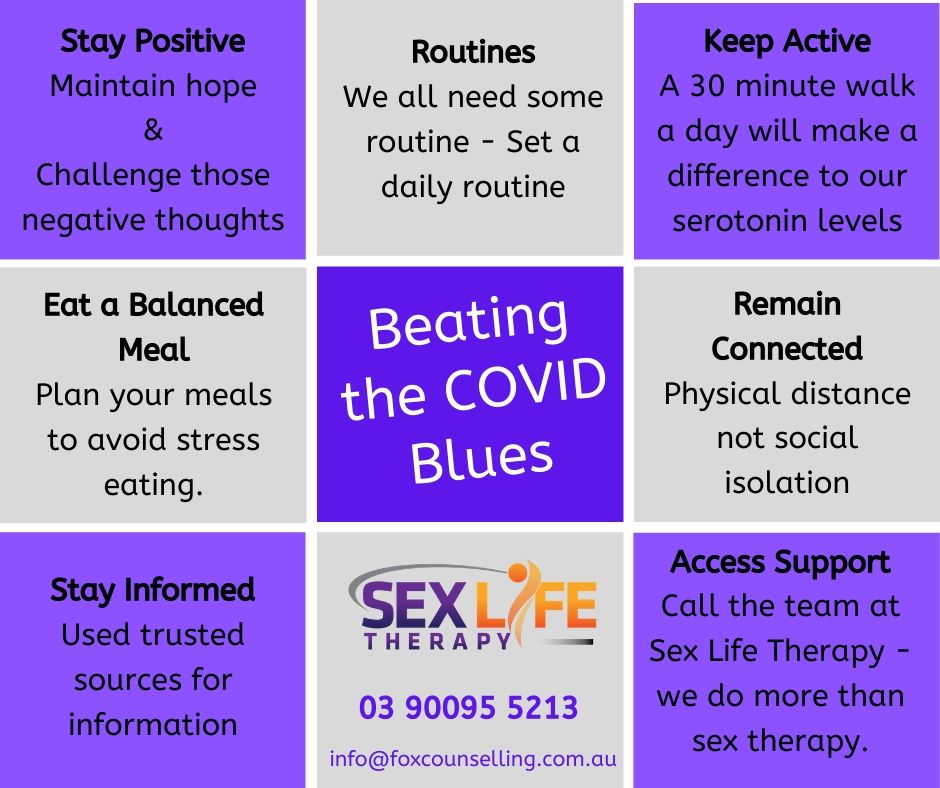The COVID-blues, COVID-stress, COVID-anxiety and COVID-depression are all things. At least in my book. In a recent article in The Conversation Stephen Carbone and Antho ny Jorm from the University of Melbourne argue we need to flatten the other curve – the mental health crisis curve that is developing in response to the social lockdown and isolation.
ny Jorm from the University of Melbourne argue we need to flatten the other curve – the mental health crisis curve that is developing in response to the social lockdown and isolation.
I spent much of April promoting ways to maintain good psychological well-being and mental health during this time on social media (Facebook and Insta). We are in unprecedented times. We do not know how to respond to this crisis.
Many of the natural disasters around Australia we have experienced in recent history (fire, floods and cyclones) are known to us. We have experienced them before. Each is different, yet we know them. This is unknown. We do not know how to react; to respond. This is new to us.
Around 30% of people are reporting moderate to high levels of anxiety and depression in a survey of 1,200 Australians conducted by Caroline Gurvich, Senior Research Fellow at Monash University. A majority of participants indicated mild level of anxiety and depression.
So Corona-blues is a thing. Rona-stress is a live and we can do something about it!
There is no shortage of suggestions on how to remain psychologically well during this time. I will try to summarise the strategies to give you some good tools to keep the Corona-blues and COVID-worries away.
Stay Positive
Staying positive is an achievable task at times like these. A sense of hope that the situation will get better; that it will pass; that there is a brighter future is important to staying positive. I often recommend a daily practice of gratitude, gratefulness and appreciation is good too. Each day identify three aspects of the day or your life for which you appreciate or are grateful for experiencing or having.
Another aspect to staying positive is to listen to the messages are telling yourself. Challenge the negative thoughts and ask yourself: “What is the evidence to support this thought?” or “How would someone think about this differently?” or “Why am thinking that thought?” Learning to challenge our negative thoughts is the foundation to being in a positive frame of mind.
Maintain a Healthy Lifestyle
A healthy lifestyle goes hand-in-hand with staying positive. Our lives are governed by routines. With the Corona lockdown our routines have been changed dramatically – we are working from home; we have partners home; we are supervising our children’s learning – this was not the routine we were experiencing earlier in the year.
Set a routine – daily and weekly. Plan time for yourself and your relationship, as well as your family. Include activities which are fun (reading or watching an old favourite movie) and rewarding; something which provide a sense of achievement like creating (craft or other hobbies) learning a new skill (think swearing in Urdu or learning to crochet).
Stay active. This does not mean exercise and fitness, although this certainly can be part of it. Physical activity can help reduce stress and build resilience. Not to mention release our feel-good hormones as well. Even a 30-minute walk is good activity.
Eat balanced and healthy meals. During times of stress it is easy for us to turn to comfort food which are often high in sugars. Eating regularly and healthy is important to good mental health and psychological well-being.
Remain connected You can be connected with people via technology. IN some areas you can be with people and maintain social distance. We are seeing some highly creative ways neighbours are spending in-person while maintaining their physical distance. Social connection is a bedrock of our existence.
Stay Informed
Choose good/trusted source of information. Social media is not a good source. Use an Australian government or State government source. The World Health Organisation (WHO) has good resources and information – yet this is not tailored to our local context. Each State in Australia is responding in slightly different ways. Rely on National and State governments information sources.
Manage your exposure to the media and social media. Listening to news channels will create, what I refer to as, news exhaustion. Reading newspapers can also contribute to this sense of Rona-burnout. And social media – it has its place. Let us be mindful in our consumption of information and not mindless.
Access Support
Supporting one another is important to good mental well-being. Asking for help from friends and/or professionals is a sign of strength. There are services like Lifeline and Beyondblue. You can speak to your GP or mental health practitioner.
At Sex Life Therapy, we have five therapists who are all trained mental health clinicians. We do more than sex therapy. Dr Christopher Fox is the Director of the service and an experienced counsellor and psychotherapist with over 25 years’ experience. Karen Ryles is an Accredited Mental Health Social Worker with more than 35 years’ experience in supporting people to maintain good psychological well-being. Christopher Brett-Renes is an experienced counsellor in working with LGBTIQA+ and queer communities. Nadine Atia is an experienced social worker working with people of colour and multicultural issues. Hailey Lin is also a social worker and a native Mandarin and Cantonese speaking therapist.
If you are feeling down, feeling blue, feeling stressed, feeling worried – GET HELP!
Maintaining good psychological well-being and mental health takes work. Spend time each day engaging in activities which promotes good mental health and psychological well-being. If you require support do not hesitate to reach out. There are people available to help you.
Call us today on 03 9005 5213 or use the form below.
A healthy life includes healthy relationships and a healthy sex life.
Enjoy!
Dr Christopher
Dr Christopher Fox is a Psychosexual and Relationship Therapist at Sex Life Therapy in Melbourne. He has clinics in Collingwood and Frankston. He provides eTherapy using secured platforms.
Find out more about maintaining good psychological well-being at Sex Life Therapy.
Useful Resources
Mental Health and COVID-19 (Commonwealth of Australia)
COVID-19 Resources @ BeyondBlue
Disclaimer: The information contained in this document should be read as general in nature and is only to provide an overview of the subject matter covered. Please see a an appropriate practitioner if you have any concerns.


